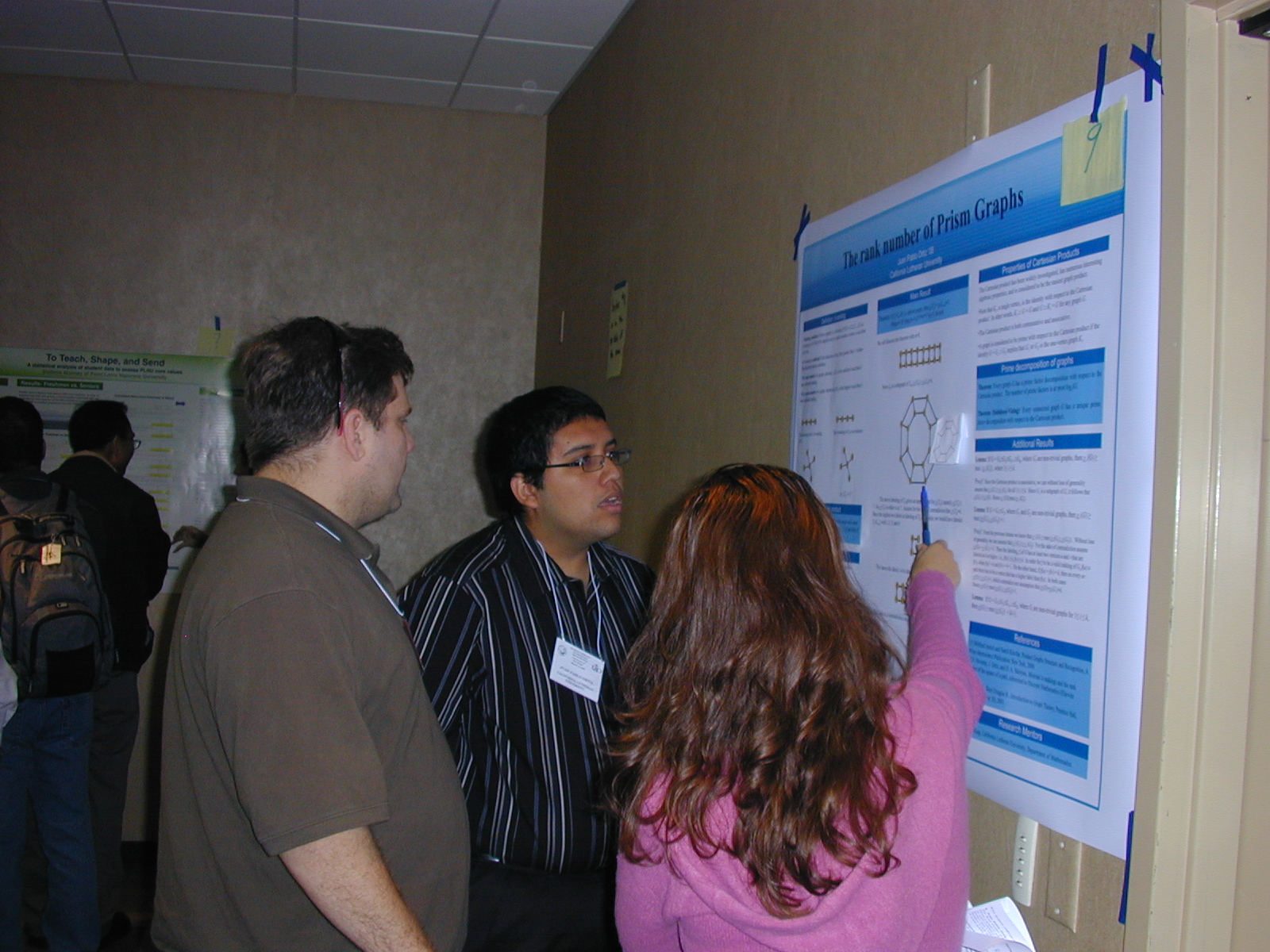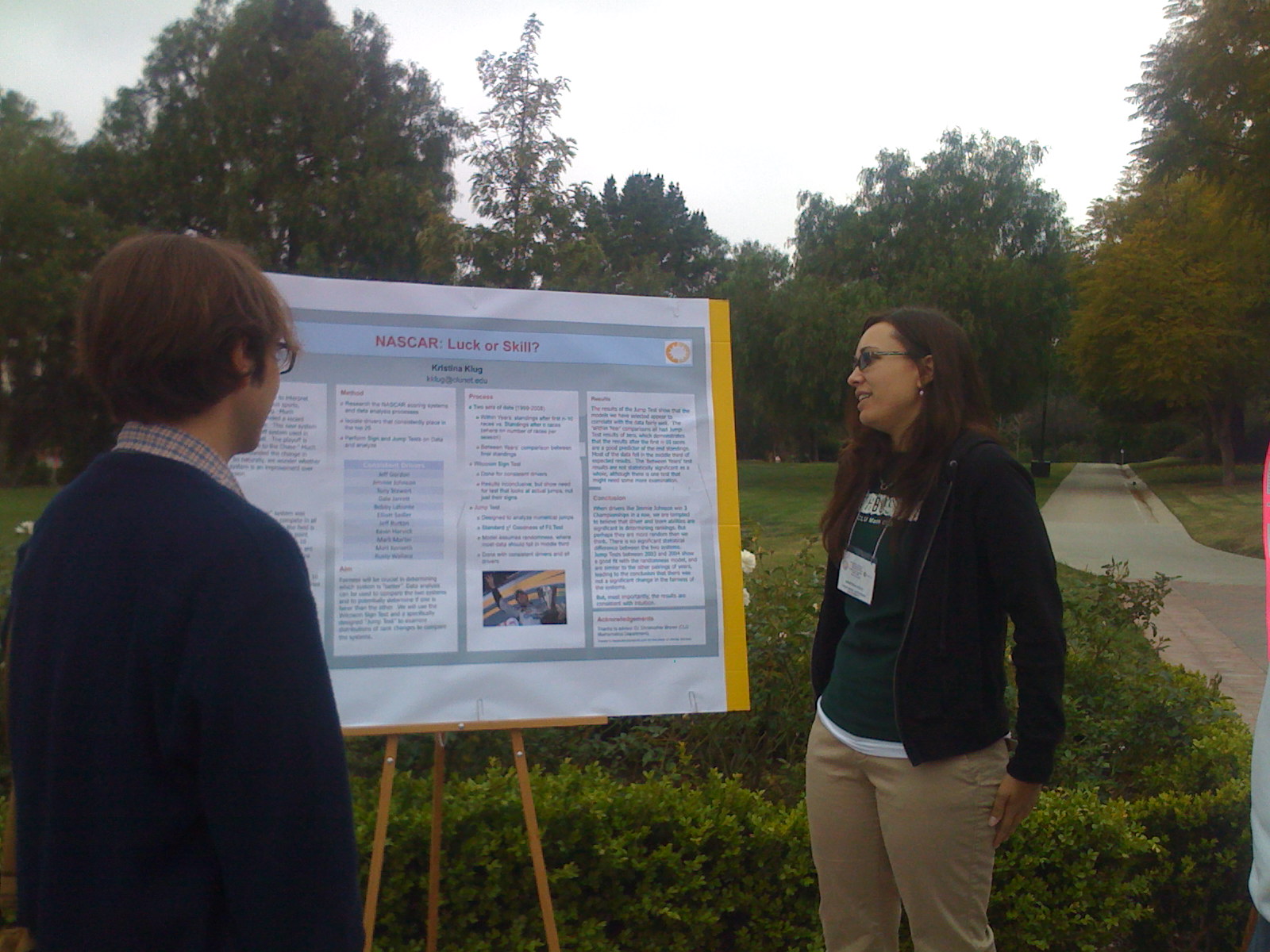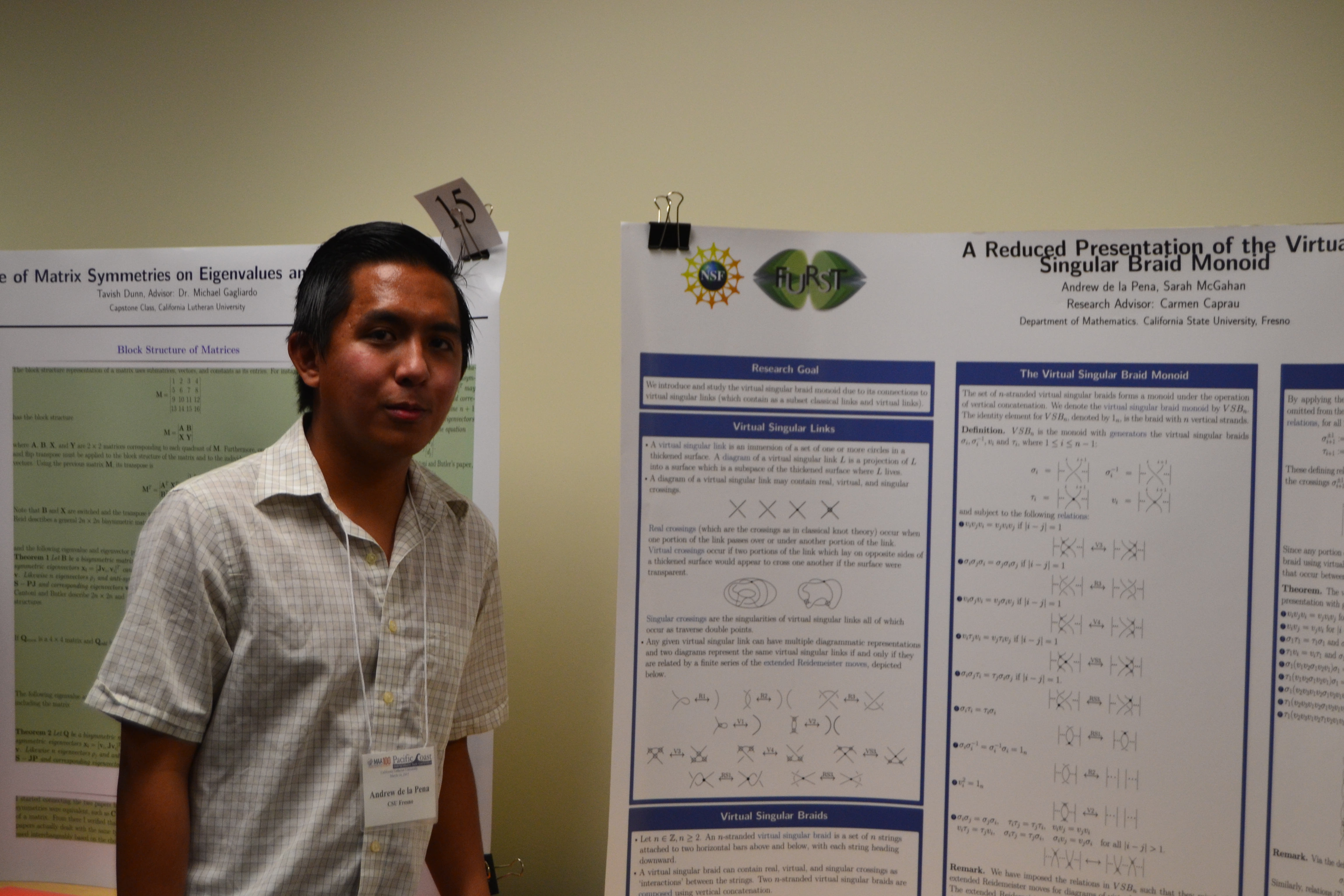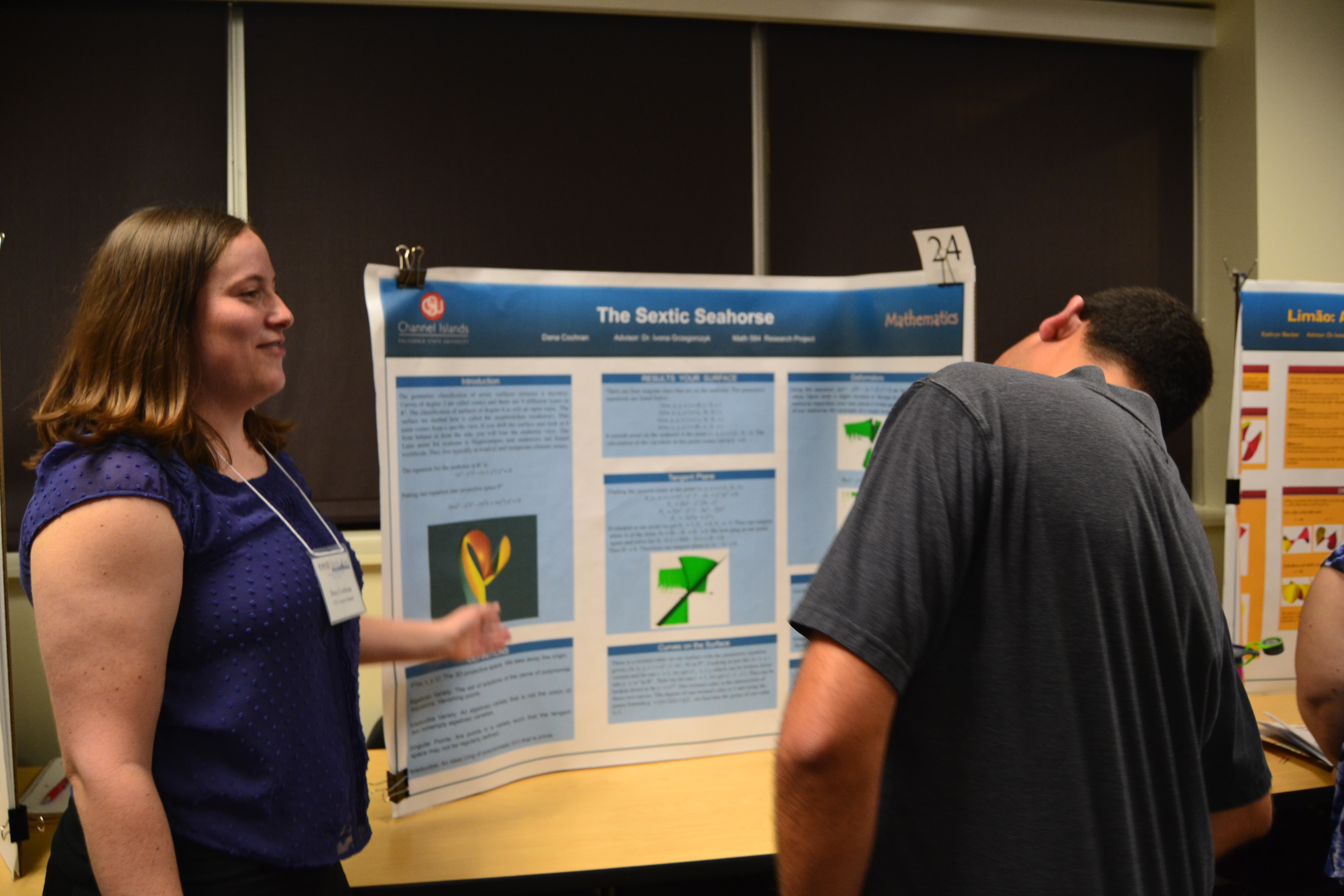Register
Register online by paying with a credit card (deadline Monday, April 24th at 5:00pm).
Students applying to present a poster or talk register by submitting their application by Mon April 10th at 12 noon (More info)
Spring 2017 SoCal-Nev Section Meeting
California State University, Northridge
Saturday, April 29 2017, 8:00am - 4:45pm
(Directions and Map)
Joint meeting with the
Preparing Undergraduates through Mentoring towards Ph.D.s (PUMP Math) program.
Welcome PUMP participants! This year, California State University's PUMP program is co-hosting the conference. The PUMP students will be giving presentations on their research throughout the conference. More details about PUMP can be found at http://www.pump-math.org/
Tentative Schedule
(exact times may shift by up to 15minutes, but will be finalized soon)- 8:00-12:00 Registration
Walkway outside Kurland Lecture Hall - 8:30-3:30 MAA Book Sale
Matador Bookstore Patio -
9:00-9:10 Welcome Remarks by Yi Li, CSUN Provost (and mathematician)
Kurland Lecture Hall, Valley Performing Arts Center - 9:10-10:10 Invited Address by Daniel Katz, CSU Northridge
Avoiding Any Resemblance: Low Correlation Sequences
Kurland Lecture Hall, Valley Performing Arts Center - 10:10-10:15
Section Business Meeting
Presentation of Section Distinguished Teaching Award
- 10:15-11:15 Student Poster Session
View the Call for Posters and apply on-line
Organized by Gail Tang, University of La Verne, Berit Givens, Cal Poly Pomona, and Eddie Tchertchian, Pierce College.
Matador Bookstore Patio - 11:30-12:30 Invited Address by German Enciso, University of California, Irvine
Using Mathematics to Better Understand Molecular Biology
Kurland Lecture Hall, Valley Performing Arts Center - 12:30-1:30 Lunch
Matador Bookstore Patio - 1:30-3:30 Student Contributed Paper Presentations
View the Call for Papers and apply on-line
Organized by Gail Tang, University of La Verne, Berit Givens, Cal Poly Pomona, and Eddie Tchertchian, Pierce College.
Chaparral Hall - 3:30-3:45 Afternoon Break
- 3:45-4:45 Invited Address by Mohamed Omar, Harvey Mudd College
Mathematics in Pain
Kurland Lecture Hall, Valley Performing Arts Center
Directions and Maps
A campus map with Meeting Locations annotated is available.
Additional Campus Maps and Driving Directions can be found on the CSUN Campus Maps page .
Recommended Parking: Lot G3 or Structure G3. Permits can be purchased for $8 at one of the Info Booths or online at https://csun.thepermitstore.com. Permits from other CSU campuses are valid.
Additional information about Visitor Parking and daily parking permits is available on the CSUN Parking page.
Registration Fees
| Pre-Registration | |
| Nonmember | $50 |
| MAA Member | $45 |
| Student | $15 |
Student poster presenter (2 free registrations per poster included as part of the poster application process) |
$0 |
| Box Lunch Box lunch consists of a sandwich, chips, cookie, and either water or soft drink. The Sandwich choices are: Turkey and cheese |
|
| Lunch: MAA Member, Non-member, or Student | add $11 |
| Lunch: Student presenter (max of two free lunches per presentation) | $0 |
On-site registration will be available for the meeting, but will be $5 more than the pre-registration charge.
Register on-line
Click here to register on-line and pay by credit card (deadline is Monday April 24th by 5:00pm).
Questions about registration
Questions about registration can be directed to Ernie Solheid, esolheid at fullerton.edu
German EncisoUniversity of California, Irvine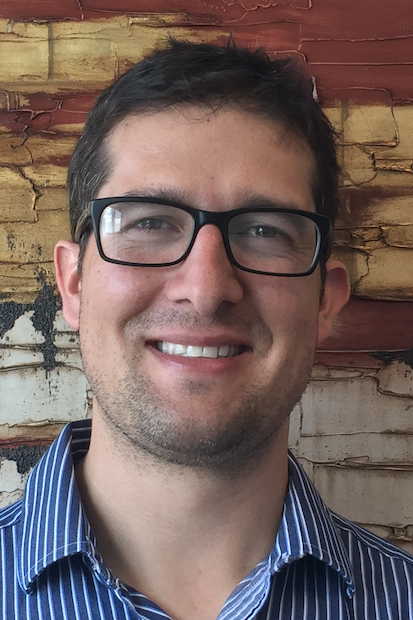 |
German Enciso is an Associate Professor at the University of California, Irvine Mathematics Department, with a joint appointment in the Department of Developmental and Cell Biology, working in the area of systems biology at the interface between the mathematical and the biological sciences. |
Using Mathematics to Better Understand Molecular Biology
Molecular biology is becoming increasingly quantitative, with many machines measuring large amounts of data. Mathematical biologists provide a different perspective and describe different types of data using mathematical models. In this talk I will cover the main tools used and some of the successes that quantitative modeling has had in the field. I will also talk about Math CEO, a middle school outreach activity for Hispanic underrepresented minorities in Southern California.
Daniel KatzCSU Northridge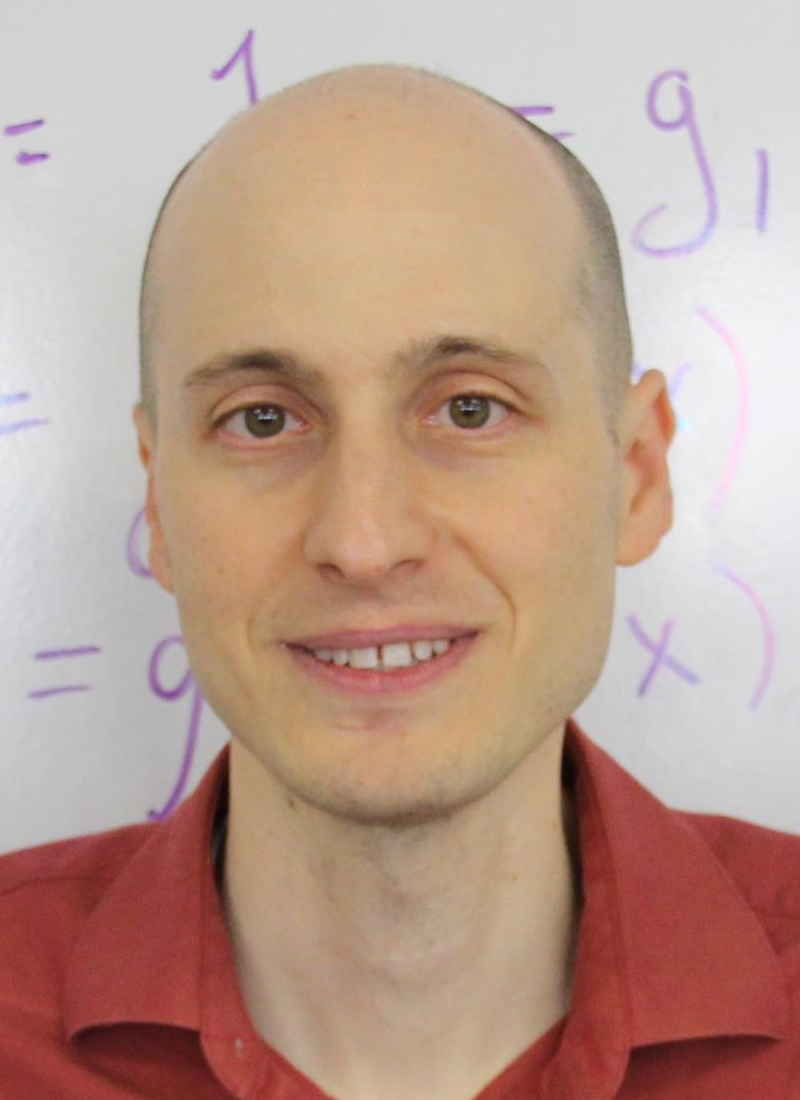 |
Daniel Katz is an Assistant Professor of Mathematics at California State University, Northridge. He received his Ph.D. at Caltech, and now investigates problems in discrete mathematics and number theory. Many of these problems are motivated by information theory, and the methods used run the gamut from Galois theory to complex analysis. A common thread in his work is a focus on mathematical objects with a great deal of underlying algebraic and combinatorial structure, such as finite fields. He enjoys studying a wide variety of problems with students, and publishing the results in mathematics and engineering journals. |
Avoiding Any Resemblance: Low Correlation Sequences
A communications engineer asks us for a finite sequence of +1s and -1s that does not resemble any shifted version of itself. This is known as a low autocorrelation sequence, and it assists synchronization: any time-delayed version of the sequence is easily distinguished from the original. Then the engineer asks for two sequences such that no shifted version of one resembles the other. This is a pair of low crosscorrelation sequences. They identify two different users, and their low crosscorrelation prevents us from confusing one user with the other, even if there is a relative shift between their sequences caused by a time delay due to them standing at different distances from us. For an effective communications system, we want a pair of sequences where each sequence has low autocorrelation and where the two sequences have low crosscorrelation with each other. Pursley and Sarwate proved a fundamental bound on how low we can simultaneously make autocorrelation and crosscorrelation. In this talk, we describe a combinatorial construction of polynomials on the complex unit circle that provides sequence pairs whose performance is very close to the Pursley-Sarwate bound. This is joint work with two undergraduates, Sangman Lee and Stanislav Trunov.
Mohamed OmarHarvey Mudd College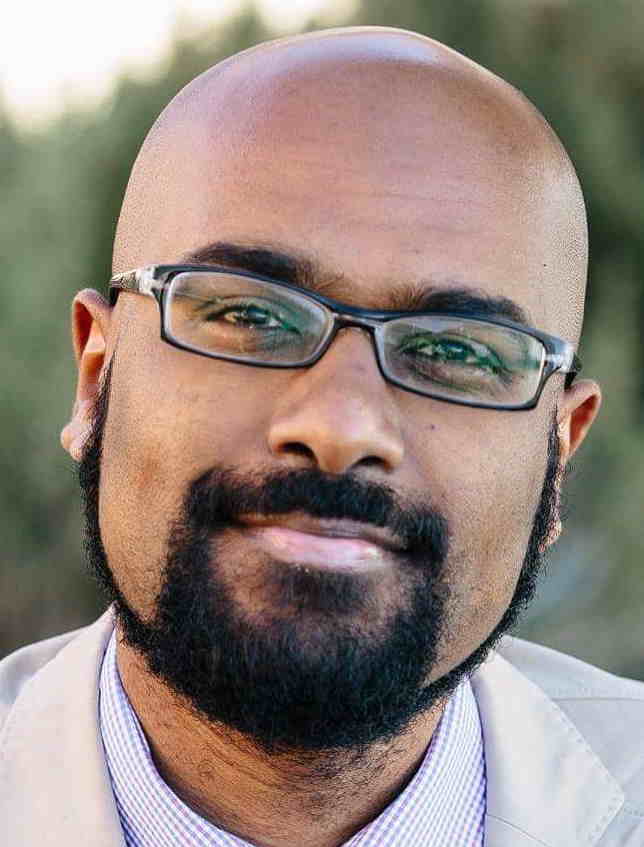 |
Mohamed Omar is an Assistant Professor of Mathematics at Harvey Mudd College. He received undergraduate degrees in Pure Mathematics and Combinatorics & Optimization from the University of Waterloo, and his Ph.D. in Mathematics from the University of California, Davis where he received the Dean's Prize for outstanding thesis in the Division of Mathematical & Physical Sciences. This was followed by a postdoctoral position at the California Institute of Technology where he received the ASCIT award for teaching. Mohamed is interested in seeing algebra come alive in discrete mathematics, primarily in combinatorics, graph theory and discrete/convex geometry. He is also interested in enumerative and geometric combinatorics. Mohamed has a passion for outreach through mathematical enrichment, serving on problems committees for several national mathematics competitions in the United States and Canada, and sitting on the Board of Directors of the Mathematics Foundation of America. He is also very passionate about food from all over the world and hip hop from the late 1990s and early 2000s. |
Mathematics in Pain
In times of personal struggle, it is very difficult to think about our work, and we often struggle with the question "How do I move forward?" This talk explores the various ways in which the speaker has coped, managed, and even shined as a life-long student of mathematics amidst his emotional and physical adversities. Three major themes will emerge. One is how limitations forced creativity in the classroom, and the enrichment this gave the speaker's teaching. Another is a renewed perspective on students' struggles in mathematics. Finally, the speaker laments on his struggle in asking for help, and how the right help led to some fascinating technological discoveries that can be embraced by the mathematical community at large.
Student Poster Session and Student Contributed Paper Session
Students (undergraduate and graduate) are invited to submit short proposals for the Poster Session or the Contributed Paper Session of the Spring 2017 Section Meeting of the MAA, taking place on Saturday, April 29 at CSU Northridge.
These sessions accept contributions in all areas of mathematics, including research and pedagogy, and all complete proposals will be considered. The selection of talks and posters will be based on interest to the expected audience, on common themes with other submissions, and on scheduling constraints. Since space and time are limited, submissions for the Contributed Paper Session should indicate whether you are willing to give a poster if not accepted for a talk.
Applications to present in either the poster session or in the contributed paper session are submitted online. Applications include submitting an abstract (max 150 words) and are be due by 12 noon on Monday April 10, 2017.
The application to present constitutes registration for the conference (up to two presenters per presentation). Additional presenters beyond two should register for the meeting through the regular online registration.
The Student Resources page of the MAA website has useful articles about writing an abstract and giving presentations. Be sure to check it out for helpful tips!
Direct questions to Gail Tang.
